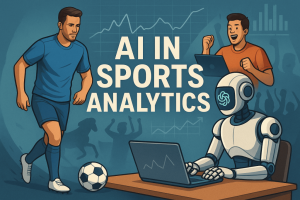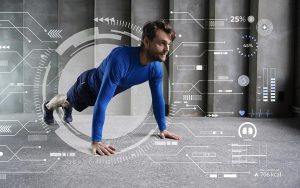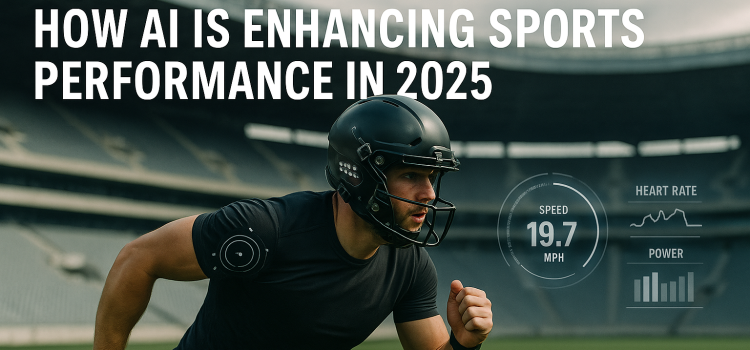
Introduction
In 2025, artificial intelligence (AI) continues to shape every facet of our lives, and the world of sports is no exception. Athletes, coaches, and sports organizations are increasingly turning to AI to unlock new levels of performance, improve training techniques, and gain a competitive edge. With the advancement of AI technology, sports performance is reaching new heights, with AI-driven tools and wearable tech revolutionizing how athletes train, recover, and compete.
From real-time data analysis to personalized coaching, AI is transforming the sports industry. In this article, we’ll explore how AI is enhancing sports performance in 2025 and the cutting-edge tools that are making it possible. Whether you’re a professional athlete or a weekend warrior, AI can take your performance to the next level.
What is AI in Sports?
At its core, AI in sports refers to the use of artificial intelligence technology to collect, analyze, and interpret data that can improve athletic performance. AI systems can analyze vast amounts of data, offering insights that would be impossible for humans to identify manually. These systems help athletes, coaches, and sports scientists make smarter decisions based on evidence, not just intuition.
AI in sports includes machine learning, sports analytics, wearable tech, and more. Machine learning algorithms can predict an athlete’s performance and recovery, track health metrics, and even create personalized training programs. By leveraging AI, sports organizations can optimize their resources, enhance training methods, and create better strategies for competition.
AI Tools Enhancing Sports Performance

Let’s take a deeper look at the AI tools that are enhancing sports performance in 2025:
1. AI-Driven Sports Analytics
Sports analytics has been around for years, but AI is taking it to the next level. AI-powered sports analytics allows for the collection and analysis of massive amounts of data in real-time. From performance metrics such as speed, heart rate, and stamina to tactical data on player positioning, AI tools can break down complex data into easily understandable insights.
- Game analysis: AI can analyze the entire game in real-time, highlighting the strengths and weaknesses of individual players and teams. Coaches can use this data to adjust tactics or provide targeted feedback to athletes.
- Player tracking: AI-powered cameras and sensors can track player movements on the field, providing coaches with detailed information on performance metrics like speed, agility, and endurance.
- Injury prediction: With AI technology, it is possible to predict and prevent injuries by monitoring changes in an athlete’s biomechanics. By analyzing patterns, AI can identify signs of stress or fatigue before they lead to injury.
2. Wearable Tech for Athletes
Wearable tech has become a game-changer for athletes, providing real-time data that can help enhance training and optimize performance. Many wearables today, powered by AI, monitor vital signs, movement, and recovery, offering data-driven insights to athletes and coaches.
- Smartwatches and fitness trackers: Devices like the Apple Watch and WHOOP strap are not just for general fitness; they have become essential tools for athletes. These wearables track heart rate, sleep quality, and recovery, providing AI-generated insights that help athletes train more effectively.
- Smart clothing: Companies are developing smart clothing that can measure muscle performance, breathing rate, and even body temperature. AI in these wearables provides actionable feedback to optimize performance and reduce injury risks.
- Biomechanics tracking: Wearables that track movements with high precision are helping athletes perfect their techniques. For example, tennis players can use wearable devices to track their swing mechanics, receiving real-time feedback on improving efficiency and form.
3. AI-Powered Coaching and Training Programs
AI is revolutionizing athletic training by offering personalized training programs. AI systems can adjust training routines based on an athlete’s performance and recovery patterns, creating highly tailored programs to meet individual needs.
- Virtual coaches: AI-powered virtual coaches can analyze video footage of athletes in real-time and provide instant feedback. This is especially useful in individual sports like tennis, golf, or track and field.
- Customized workouts: AI can help design customized workouts based on an athlete’s strengths, weaknesses, and goals. This makes training more effective and efficient, ensuring that every session contributes to improving performance.
- Automated adjustments: AI systems can adjust training loads and routines in real-time based on how the athlete is performing. For example, if an athlete’s performance is declining due to fatigue or injury, the AI can automatically reduce the intensity of the workout to aid recovery.
4. Sports Data Analysis and Visualization

Sports data analysis using AI is not just about gathering stats; it’s about turning those numbers into actionable insights. With the help of AI, sports data is now analyzed and visualized in ways that allow coaches and players to make informed decisions.
- Data visualization tools: AI-powered data visualization tools help athletes and coaches understand complex data sets by presenting them in easy-to-read graphs and charts. This helps identify patterns in performance and makes it easier to track improvement over time.
- Real-time analytics: AI allows for real-time analysis during games and training, giving teams the ability to make on-the-spot tactical decisions. For instance, football teams use AI to assess the opponent’s formation and adjust their strategy during the game.
5. AI and Mental Health Support for Athletes
While AI is traditionally seen as a tool for physical performance, it’s also being used to support athletes’ mental health. Mental health is a crucial aspect of sports performance, and AI is being used to monitor emotional and psychological well-being.
- AI for stress management: AI systems can track changes in an athlete’s behavior or stress levels through data from wearables, social media, or even direct communication. This information can be used to create mental health strategies tailored to the athlete’s needs.
- Performance psychology: AI is also helping with sports psychology by analyzing athletes’ emotional and psychological states during training and competition. With this data, coaches can offer better support to athletes under pressure.
Stress, anxiety, and mental fatigue can negatively affect athletic performance. AI tools like mood trackers and biometric sensors can analyze athletes’ physiological responses to stress. Based on these insights, athletes can receive personalized recommendations to improve their mental health, such as:
- Mindfulness exercises or breathing techniques tailored to their current stress levels.
- Sleep patterns: AI can track sleep quality and suggest improvements to optimize mental clarity and focus.
How AI is Shaping the Future of Sports Performance

AI’s role in sports is continuing to evolve, and the future looks bright for athletes who leverage these technologies. As machine learning algorithms improve and more data is collected, AI’s ability to predict, prevent, and optimize performance will only increase.
- Personalized training: AI will make workout plans just for each athlete. It will change exercises to fit each person’s needs and goals.
- AI-powered team analysis: Teams will use AI to study old games and current stats. This will help them plan smarter plays and improve their chances to win.
- Injury prevention: AI can watch an athlete’s body in real time. It can spot warning signs early and help stop injuries before they happen.
- Expanded virtual training: Athletes will train in virtual worlds made by AI. They can practice skills safely without risking real injuries.
Challenges and Limitations of AI in Sports

While AI in sports offers numerous benefits, it does come with some challenges. Here are a few limitations that athletes and teams may face when using AI technology:
1. High Costs
Advanced AI systems, especially those used for real-time performance analysis and recovery, can be expensive. For smaller teams or independent athletes, the cost of these technologies can be prohibitive.
2. Data Privacy Concerns
Athletes’ performance data is valuable but also personal. There are concerns about how this data is stored and used, especially if it falls into the wrong hands. Maintaining privacy and ensuring data security will be a top priority for future AI applications in sports.
3. Reliability and Accuracy
While AI can analyze data and offer insights, it still relies heavily on the quality of input data. If the data collected is inaccurate or incomplete, it can lead to false recommendations and poor decision-making. Ensuring the accuracy and reliability of AI tools is critical for effective use.
The Future of AI in Sports
Looking ahead, AI will continue to shape the future of sports in exciting ways. As technology improves, AI will become even more integrated into every aspect of athletic performance, from training to competition. With sports analytics becoming more sophisticated, AI will allow for even more personalized coaching and smarter game strategies.
In the future, AI will be able to predict athlete performance with even greater precision. AI-powered wearables will continuously monitor athletes’ health, adjusting training loads and recovery plans in real-time.
Conclusion
AI’s impact on sports performance in 2025 is profound, revolutionizing how athletes train, recover, and compete. From wearable tech and AI-powered coaching to real-time sports data analysis, AI is offering athletes and coaches powerful tools to optimize performance. As technology continues to advance, the future of sports will likely see even greater integration of artificial intelligence, making it possible to unlock human potential in ways previously unimaginable.
The rise of AI in sports is transforming the way athletes approach their craft, helping them become more efficient, focused, and resilient. If you’re an athlete, coach, or sports enthusiast, embracing AI technology will be key to staying competitive and achieving peak performance in 2025.
Call-to-Action (CTA): Ready to enhance your sports performance? Explore the latest AI-powered tools and start using artificial intelligence to optimize your training today! Whether you’re an athlete or a coach, AI can help take your performance to the next level.









